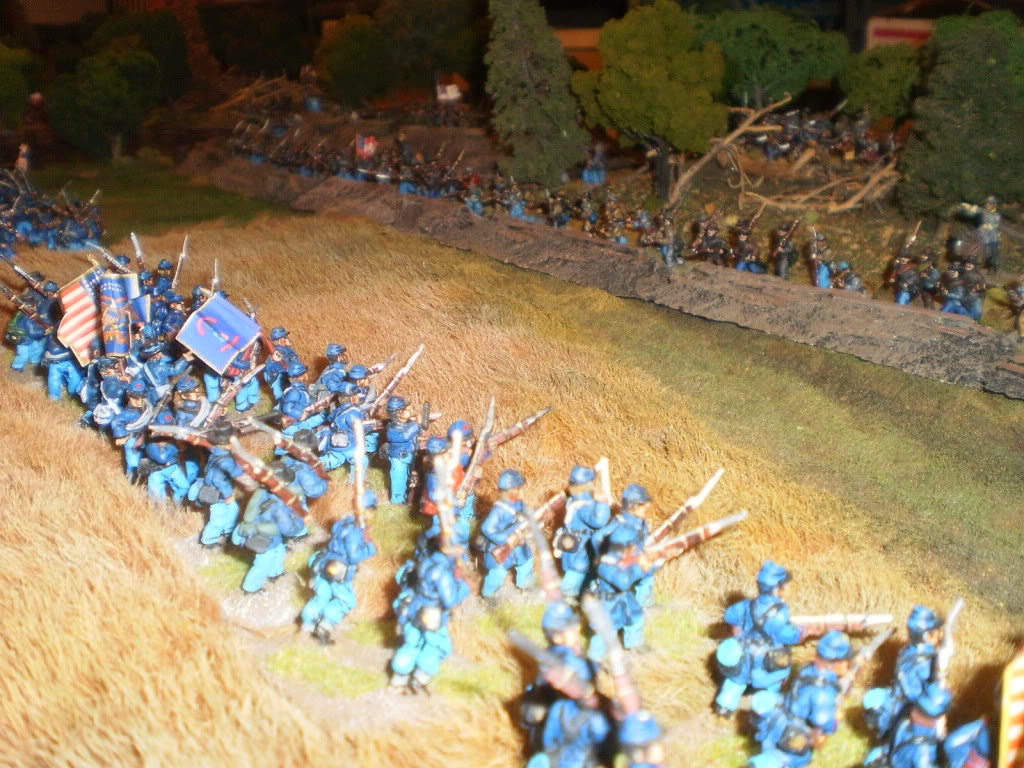JUNE 5, 1864:
The Battle of Cold Harbor (Day Six):
When the casualty
figures from Cold Harbor come in, there is a public outcry in the North.
It grows
even louder when stories of the failed assault begin reaching the public’s
ears. In the aftermath of Cold Harbor, the Peace Democrat and Copperhead
factions are revivified.
It is a
dangerous time for the Lincoln Administration. The Presidential election is
only 20 weeks away, and it appears that the still-popular and ever bloviating
General George Brinton McClellan (retired) will be the Democratic candidate for
President along with Peace Democrat “Gentleman George” H. Pendleton, a
Congressman from Ohio who opposes the war. The two Georges run as “Peace
Candidates” not Democrats. They formally eschew the Democratic platform, and
base their public appeal on favoring a quick end to the war.

There are
calls to remove Grant from command, even some to reappoint McClellan as
General-in-Chief. When Lincoln ignores these calls, the public’s anger toward
General Grant is transferred on to President Lincoln, and his popularity
plummets. The coming summer will see it sink ever further.
One of
Grant’s most vociferous critics is Mary Todd Lincoln. The First Lady makes no
secret of her disdain for “that butcher,” and some of her comments reach the
papers. Mrs. Lincoln’s antipathy toward Grant will have tragic consequences at
the war’s end.
The
Northern papers seize angrily, the Southern gleefully, upon the idea of Grant
as a butcher. Perhaps it is unsurprising that the papers (both North and South)
speculate that Grant was inebriated at Cold Harbor --- however, there is no
objective evidence of this. When Lincoln
is pressed to relieve Grant, he answers simply, even to his wife, “I can’t
spare this man. He fights.”
Stories of
Grant’s drinking are a dime a dozen, and may be worth just that much:
After his
graduation from West Point in 1843, Grant was assigned to a series of armory
and garrison posts. At one time, he was one of only 50 Captains in the U.S.
Army. The Mexican War gave a boost to his career; he was one of the officers
engaged at the Battle of Chapultepec, which won the war for the United States.
But after the war, things returned to normal as the army was again stripped to
its bare-bones minimum.
Grant
married Julia Dent in 1848, and they had four children. In the 1840s, the Army
was neither glamorous nor an effective way to support a growing family. Grant
actually had to run a small business on the side to supplement his army pay.
In 1854,
he was assigned to a frontier post in then- very remote Humboldt, California.
When he took up his duty station at the isolated outpost, Grant decided to leave
Julia and the children safely back in the East.
Grant was
unhappy in Humboldt. He was bored with his do-nothing duty. His commanding
officer was a martinet. He desperately missed his wife and family. And so he
took solace in the bottle. According to the various tales that have come down
the years, he was discovered to be drunk on duty, and was offered the choice
between resigning his commission or being court-martialed. He decided to
resign.
Grant
himself admitted, “Intemperance had not a little to do with my resignation.”
There is little doubt that the man who eventually became President of the
United States was an alcoholic as that term is understood today, and was
probably a binge drinker. However, tales of his being roaring blind drunk in
combat simply don’t seem to be true.
Work (of which there was plenty as General-in-Chief) and the relative
nearness of Julia and the children in Washington, D.C. served as an anodyne to
liquor.
President
Lincoln, for one, did not seem particularly concerned about his
General-in-Chief’s storied intemperance: “I
wish some of you would tell me the brand of whiskey that Grant drinks. I would
like to send a barrel of it to my other generals.”
Grant was
no butcher. The son of a tanner, he had grown up among slaughtered animals, and
rather than hardening him, the experience made him sensitive. He could not
abide cruelty to animals nor men. The sight of blood made him dizzy; the smell
of blood made him sick; gore horrified him.
More than
one Civil War memoirist tells the same tale of Grant after a battle: Grant would dutifully view the battlefield.
He would not turn away from scenes of carnage. He would visit the wounded at
the field hospitals. He would return to his headquarters. And then he would
retire to his rooms, giving orders that he not be disturbed. His staff learned
to tactfully ignore the muffled sound of wracking sobs that occasionally
reached their ears from behind the General’s closed doors. After a few hours or
an evening Grant would reappear among them, ready to carry on.
The cost
of war was heartbreaking, but Grant understood better than most Union generals
that in the Civil War the cost of war was the cost of peace.
The Battle
of Piedmont:
Having pulled most
of the Confederate troops out of the Shenandoah Valley in order to fill his own
depleted ranks, Robert E. Lee has made it possible for Union cavalry to retake
the Valley against a remnant force. Of 5,000 Confederates in the battle, 500
are killed and almost 2,000 are captured when their line breaks. Union killed
and wounded are about 800 of 10,000.





